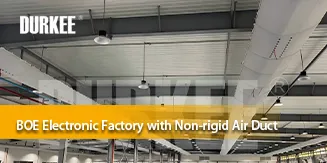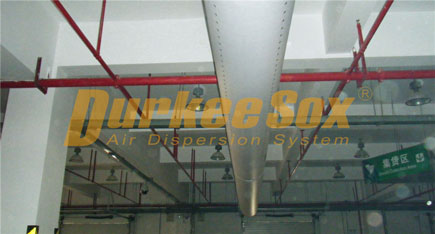.jpg) DURKEE at AHR Expo 2026 – Non-Rigid Air Duct & Thermal Insulation Solutions
DURKEE at AHR Expo 2026 – Non-Rigid Air Duct & Thermal Insulation Solutions
 BOE Vietnam Factory: Non-rigid Air Duct Solutions for Electronic Industry
BOE Vietnam Factory: Non-rigid Air Duct Solutions for Electronic Industry
 Why Fabric Air Ducts Are the Preferred Choice for Ventilation in Large Spaces
Why Fabric Air Ducts Are the Preferred Choice for Ventilation in Large Spaces
The material-based design of the commonly used fabric air duct, also known as textile ductwork, can prevent condensation. The anti-condensation principle of flexible ducting is mainly to use the permeability of the fiber of the pipe wall to form a cold air layer on the surface of the pipe wall, so that there is basically no temperature difference between the inside and outside of the piping surface, thereby preventing condensation. (The greater the permeability of the material, the smaller the temperature difference between the surface and the interior of the material, and the less likely it is to condense.) At the same time, the hydrophobic treatment of the fiber material surface of the processing duct further improves the surface anti-condensation effect. At the same time, the textile ducting can also prevent condensation on the building structure and ceiling. The flexible air duct only needs to be added with jet holes to form a "protective layer" of airflow on the building surface, and it can prevent condensation through several aspects:
1. The fabric air duct has flexible openings, which can send air toward the condensation prevention surface, promote surface evaporation through a certain wind speed, and prevent condensation water.
2. Form a lower temperature area near the ceiling height to prevent water vapor from floating.
3. When the humid air passes through the unit, the air humidity of the jet from the fabric ducting to the surface of the anti-condensation structure has been greatly reduced, so the air moisture content near the surface area is low, and it is not easy to condense on the structure surface. With the advantages of anti-condensation, combined with its aesthetics in swimming pools, which means that Durkduct flexible air ducts are the ideal choice for anti-condensation in swimming pools".
The fabric ducting system is discharged under static pressure, and the material is divided into permeable type and non-permeable type. The first is to penetrate the wind through the fiber of the whole piping surface, and the second is to make holes in the surface of the ducting and to throw out the wind through the spray holes. It is usually a linear and uniform opening air supply. The combination of the two methods also provides an anti-condensation effect while blowing out the wind. The permeable textile air duct can permeate the wind through the fiber of the wall of the piping, and can also open the hole on the surface of the air duct. Non-permeable flexible air ducts need to open holes in the piping surface for air supply.